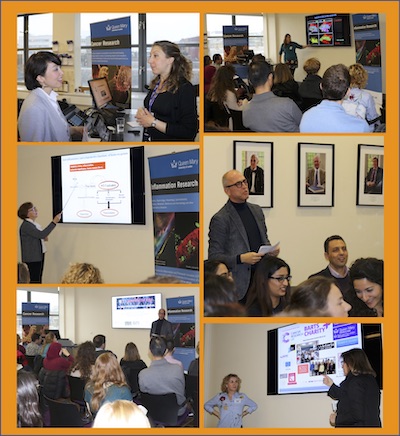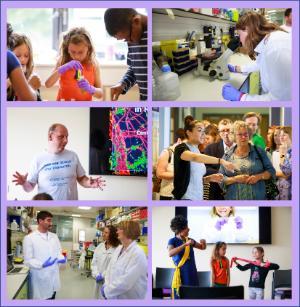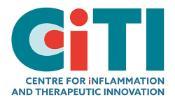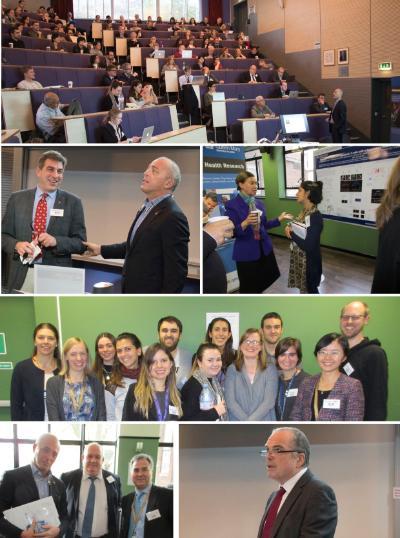Latest News
Article on chemokines and neutrophil trafficking published in Immunity
Congratulations to Tamara Girbl, Antal Rot, Sussan Nourshargh and all the authors who contributed to an article recently published in the December issue of Immunity. Entitled “Distinct Compartmentalization of the Chemokines CXCL1 and CXCL2 and the Atypical Receptor ACKR1 Determine Discrete Stages of Neutrophil Diapedesis” this seminal article reveals the importance of neutrophil derived chemokines and their receptors in the neutrophil’s journey across the venular wall during inflammation. To read the full article click here.
CiTI symposium 2018 The chronic inflammation path to cancer and obesity
 On the 16th of November 2018, The Centre for inflammation and Therapeutic Innovation (CiTI) at QMUL held a half day symposium to explore the link between chronic inflammation, cancer and obesity. Plenary lectures were presented by Dr Cecile Benezech (University of Edinburgh) and Prof Paola Allavena (Humanitas University, Milan). Talks were also given by Dr Paula Longhi, Prof Vicky Sanz-Moreno, Dr Katiuscia Bianchi and Dr Li Chan, all Queen Mary based senior researchers that are currently investigating links between inflammation and cancer or obesity.
On the 16th of November 2018, The Centre for inflammation and Therapeutic Innovation (CiTI) at QMUL held a half day symposium to explore the link between chronic inflammation, cancer and obesity. Plenary lectures were presented by Dr Cecile Benezech (University of Edinburgh) and Prof Paola Allavena (Humanitas University, Milan). Talks were also given by Dr Paula Longhi, Prof Vicky Sanz-Moreno, Dr Katiuscia Bianchi and Dr Li Chan, all Queen Mary based senior researchers that are currently investigating links between inflammation and cancer or obesity.
Arthritis in the CiTI - public engagement event 
On the first of June 2018, CiTI (Centre for inflammation and Therapeutic Innovation), in collaboration with MATURA and QMUL held its second arthritis research public enegagement event. This year a series of interactive talks and lab tours were organised, followed by an afternoon tea where attendees had the opportunity to speak to QMUL researchers and take part in some interactive stands over tea and cake.
You can read more about the event on our public engagement page.
Applications open for a CiTI/ UCB UCLpartners PhD studentship at QMUL
Studentship: UCB/CiTI Doctoral Training Programme - 1 PhD Studentship available, starting October 2018
 The newly established UCB/CiTI Doctoral Training Programme is offering research training at the PhD level in inflammation sciences. The objective of this programme is to provide an innovative approach to basic and translational inflammation science, drug discovery and therapeutic strategies, incorporating cross institutional and industrial pharma based training.
The newly established UCB/CiTI Doctoral Training Programme is offering research training at the PhD level in inflammation sciences. The objective of this programme is to provide an innovative approach to basic and translational inflammation science, drug discovery and therapeutic strategies, incorporating cross institutional and industrial pharma based training.
This programme includes the participation of the world class research and post-graduate training offered at QMUL, and industrial expertise from a leading multinational biopharmaceutical company, UCB Pharma. The student will benefit from a secondment in industry at UCB, in addition to training and transferable-skills courses that are integral to the QMUL post graduate programmes.
We are inviting PhD applications for the following project: Delivery of Agrin mRNA for cartilage regeneration
Supervisors: Dr Francesco Dell'Accio, Dr Suzanne Eldridge and Dr Bethan Thomas
For further details and information please go to the FindAPhD website.
How to apply: Please send your covering letter (detailing why you would like to apply) and CV to f.dellaccio@qmul.ac.uk
CiTI Launch Symposium
On the 1st of November 2017 CiTI was officially launched with a one day symposium to showcase the wide range of research stemming from the Centre. The day began with a warm welcome from Prof Steve Thornton, the Vice Principal for Health at the School of Medicine and Dentistry at QMUL. This was followed by an inspiring introduction from Dr Stephen Simpson, Director of Research at Arthritis Research UK. Prof Mauro Perretti, the Acting Director for CiTI then presented the background behind the development of the Centre, before the scientific session commenced. Talks were presented from across the four CiTI research themes: genomics and stratified medicine, vascular inflammation and cell trafficking, target identification and therapeutic exploitation and reparative and regenerative therapeutics. The recently appointed Arthritis Research UK Chairs, Prof Costantino Pitzalis and Prof Antal Rot also gave presentations, in addition to key note lectures from Prof Alberto Mantovani (CiTI Chair in Inflammation and Therapeutic Innovation) and Prof David Abraham (UCL). The event proved to be a success, with over a 100 attendees, and we hope to host similar events in the future.
Prof Alberto Mantovani appointed as the CiTI Chair in Inflammation and Therapeutic Innovation
We are pleased to announce that Prof Alberto Mantovani has been recruited to the William Harvey Research Institute as the CiTI Chair in Inflammation and Therapeutic Innovation. Prof Mantovani is a highly esteemed physician and immunologist at the Humanitias University in Milan. He is currently Scientific Director of the Humanitas Clinical and Research Centre, President and Founder of the Fondazione Humanitas per la Ricerca and Professor of Pathology at the State University of Milan.
Prof Mantovani studied medicine at the University of Milan and graduated in 1973. He went on to specialise in oncology at the University of Pavia and subsequently worked as a visiting fellow in the Department of Tumour Immunology at the Chester Beatty Research Institute (now the Institute of Cancer Research) in Sutton, England. Prof Mantovani also spent a number of years working at the National Institutes of Health (1978, 1979 and 1985-1986) and was promoted to the Head of the Department of Immunology and Cell Biology at the Mario Negri Institute for Pharmacological Research in Milan (1996-2005). From 1994 to 2001 he was Professor of General Pathology, University of Brescia and from 2001-2014 a Full Professor of General Pathology, Faculty of Medicine, University of Milan. Since October 2005 he has been the Scientific Director of the Istituto Clinico Humanitas and President of the Humanitas Foundation for Research. In October 2014 he was also appointed as a Full Professor of General Pathology at the Humanitas University in Rozzano, Milan, Italy.
Prof Mantovani's research is centred on the roles of the immune system in the development of cancer. His research on tumor-associated macrophages (TAMs) established inflammation as one of the causes of cancer. He is one of the most cited scientists in Italy, and one of the ten most cited immunologists worldwide. In 2005 Prof Mantovani was appointed "Commander" of the Order of Merit of the Italian Republic and has been Vice-President/President Elect of a number of societies including the International Union of Immunological Societies and the International Cytokine Society.
Professor Antal Rot appointed as the Arthritis Research UK Chair in Inflammation Sciences.png)
We are delighted to welcome Professor Antal Rot to QMUL as the new CiTI and Arthritis Research UK chair in Inflammation Sciences. Professor Rot will be based at the William Harvey Research Institute and will continue his world class research on chemokine receptors.
Professor Rot obtained his doctorate in general medicine at the Semmelweis Medical University, Budapest, Hungary where he was subsequently formally trained as an Anatomical and Surgical Pathologist. In 1983 he took up a post-doctoral position as a Fogarty Visiting Fellow with the legendary Ed Leonard, at the National Cancer Institute, NIH, Frederick, USA. After completing his post-doctoral training Professor Rot joined Sandoz/Novartis Institute for Biomedical Research, Vienna, Austria where he headed the group of Experimental Pathology. In 2009, Professor Rot was appointed as the Chair of Immunology at the University of Birmingham and moved his laboratory to the MRC Centre for Immune Regulation. In 2014 he became the Inaugural Chair of Biomedical Sciences at the Centre for Immunology and Infection, Department of Biology, University of York. In July 2017, Professor Rot will join the William Harvey Research Institute, at the Barts and the London School of Medicine and Dentistry, QMUL as the Inaugural Chair of Inflammation Sciences.
Professor Antal Rot’s research interests are related to the involvement of chemokines, their classical and atypical receptors in innate and adaptive immunity and disease pathogenesis. He has authored over 100 publications, many in high impact journals., which cumulatively have been cited over 11000 times. Currently, Professor Rot is a Wellcome Trust Investigator studying how the atypical chemokine receptor 1 contributes to bone marrow homeostasis.
CiTI now on Twitter
Follow us on our twitter page - @CiTI_QMUL


